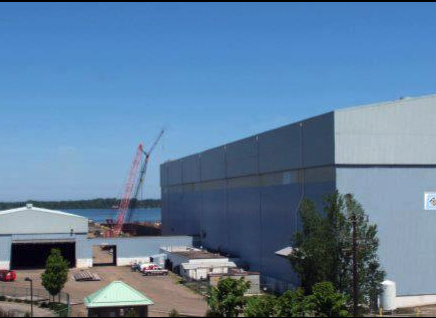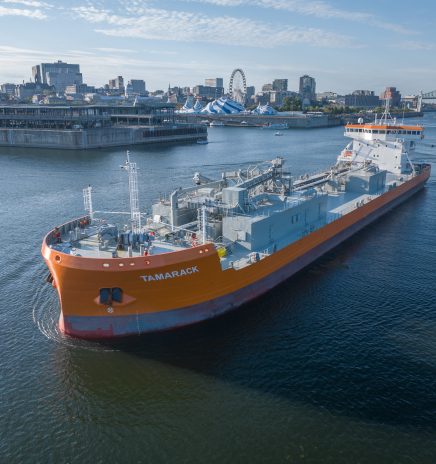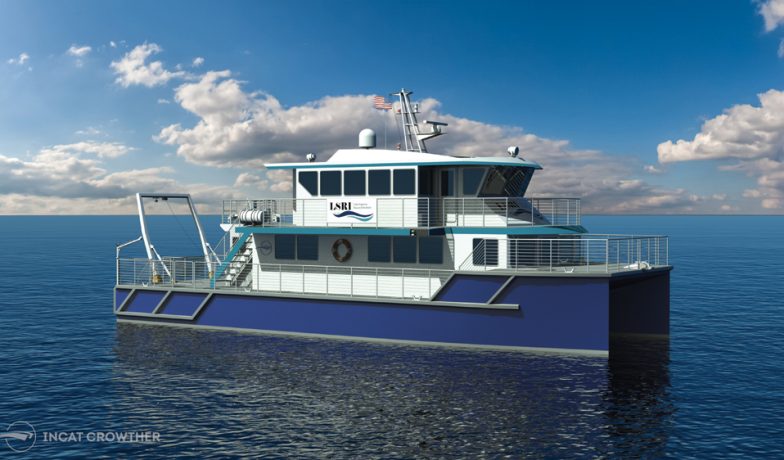Classroom Of The Future
Described as a “floating classroom,” the 65-foot, U.S. Coast Guard-certified, aluminum, catamaran will support the university’s on-water education and Research. It also features proven parallel hybrid battery propulsion technology to reduce greenhouse gas emissions. The catamaran will be 24-feet wide with a maximum capacity of 49 passengers. The main deck will have fully equipped wet and dry research labs, a moon pool opening, and fold-down diving platforms for sampling and analysis. A reinforced hull will allow operation in light winter conditions and the 4.6-foot draft will be operable in nearshore areas. A large classroom on the second deck with internet and communication technology will provide a flexible educational space. The upper deck features a large classroom adjacent to the pilot house, and two survey winches for use with a stern a-frame.
The vessel is to be fitted with an ESCO hybrid system and twin John Deere 6090SFM85 diesels, each developing 317 kW @ 2300 rpm. Service speed is 17 knots, with a maximum speed of 18 knots.
The ship is scheduled to be completed in spring of 2024 and will be sailed to Lake Superior after ice-out where it will be docked at the LSRI’s ballast water research facility at Montreal Pier.
Fund-Raising Campaign
The commission came after a successful fundraising campaign conducted by the UW-Superior Foundation. “The Together We Are Superior campaign exceeded our goal of $20 million by bringing nearly 3,900 alumni, friends and businesses together to bring excellence and distinction to our ‘anchor of the north’ university,” said Jeanne Thompson, vice chancellor for advancement and executive director of the UW-Superior Foundation. “The Superior Floating Classroom is one of the many new and innovative initiatives made possible through the campaign. Through the unwavering generosity of the Swenson Family Foundation, this contemporary multi-use vessel will be constructed and equipped completely with private funding.”
“The floating classroom will be an important addition to our research and educational programs,” said Chancellor Renée Wachter.
The Lake Superior Research Institute was created in 1967 and formally recognized by the University of Wisconsin’s Board of Regents in 1969. LSRI’s mission is to conduct environmental research and provide services that directly benefit the people, industries, and natural resources of the Upper Midwest, the Great Lakes region, and beyond; provide non-traditional learning and applied research opportunities for undergraduate students; and foster environmental education and outreach in the Twin Ports and surrounding communities. Since its founding, LSRI has employed nearly 600 undergraduate students and provided research experience for countless other students at the University of Wisconsin-Superior. Many students who have participated in research projects have gone on to pursue post-graduate education and/or careers in the sciences.

Donjon Marine Acquired by Investment Firm Tallvine
Donjon Marine Co. LLC, which operates a shipyard in the Great Lakes, has been acquired by Miami-based investment firm Tallvine Partners. Donjon Marine was founded in 1964 and operates dredging,... Read More

M/V Tamarack is First Newbuild Cement Ship in the Great Lakes in 20 Years
M/V Tamarack arrived at the Port of Montreal on August 22, completing her maiden transatlantic voyage and marking a major milestone in North American shipping. Owned by Eureka Shipping, a joint... Read More

